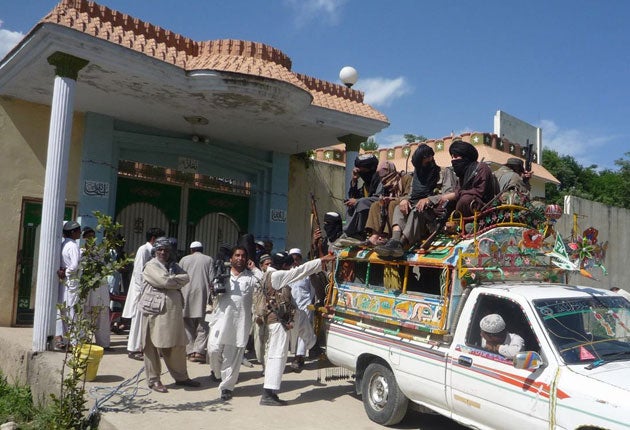Taliban fighters still swagger in Buner's fear-filled streets
Despite claims of withdrawal by insurgents, the markets are empty and the police have hunkered down

Your support helps us to tell the story
From reproductive rights to climate change to Big Tech, The Independent is on the ground when the story is developing. Whether it's investigating the financials of Elon Musk's pro-Trump PAC or producing our latest documentary, 'The A Word', which shines a light on the American women fighting for reproductive rights, we know how important it is to parse out the facts from the messaging.
At such a critical moment in US history, we need reporters on the ground. Your donation allows us to keep sending journalists to speak to both sides of the story.
The Independent is trusted by Americans across the entire political spectrum. And unlike many other quality news outlets, we choose not to lock Americans out of our reporting and analysis with paywalls. We believe quality journalism should be available to everyone, paid for by those who can afford it.
Your support makes all the difference.Despite claims by Taliban leaders that the group had withdrawn from their new foothold in Pakistan's Buner Valley, scores of fighters continued to swagger about in public last night. Long-haired and thickly-bearded young men – wearing skullcaps and bulletproof vests, with grenades attached to their belts and rusty Kalashnikov rifles slung over their shoulders – patrolled the streets.
Police were nowhere to be seen, and the market place had emptied out since the Taliban seized this fresh territory, just 70 miles from the capital Islamabad. Mohammed Kabir's family has been running a shop selling women's clothes, shoes and bangles for the past 50 years. But the Taliban banned all women from the bazaar when they entered Buner. "Now there is no business, nothing," Mr Kabir said.
A few yards away, Lal Muhammad was mourning the fate of his barber's shop. The Taliban allow him to cut hair "but shaving beards is not allowed", he said, adding: "People do not feel safe to come out."
The Taliban's push into Buner this week from the Swat Valley – where the Pakistani government has already caved in to the militants' demands for the imposition of Islamic law – has sparked domestic and global outrage.
Yesterday, the Taliban scaled down their presence in Buner, clearing away checkpoints, but they were warned to pull back completely or face the threat of military action. Pakistan's military chief, General Ashfaq Kayani, said the army would "not allow the militants to dictate terms to the government".
In a mosque in the town of Daggar, negotiations were taking place last night between a local Taliban commander, Maulvi Khalil, and Sufi Mohammed, the hardline cleric that the government has asked to broker an agreement to end hostilities.
Yet even if the Taliban do retreat to Swat, there is no guarantee they will not return. Buner's residents fear the state is in no position to guarantee their safety. Over the past fortnight, they have been forced to look on helplessly as up to 1,000 armed militants poured in, seizing property, attacking security forces, and forcing residents to flee as they imposed their brutal brand of Islam on the area.
In the face of the threat, the government dispatched reinforcements of 10 paramilitary platoons this week, but they came under attack as they scrambled to secure official buildings and bridges.
"Things are very bad," said Abdur Rashid, a senior police official in Buner, admitting that his men were unable to maintain a presence on the streets and were hunkered down in their stations. In the whole of Buner, a district of half a million people, fewer than 500 police constables are at work. "When you are confronted with better-equipped and better-trained people who have higher morale, the writ of the district police collapses," Mr Rashid added.
Instead, it was the residents who initially offered resistance. Last year, a Taliban encroachment was rebuffed by the people of Shalbandai village, who formed a militia. After they fought back against the Taliban, the village was hit by a suicide bombing that killed more than 30 people.
Then, earlier this month, Fateh Khan, a wealthy businessman, gathered members of his clan to fight the Taliban's entry into Buner. His militia inflicted heavy casualties but the Taliban were able to call for reinforcements from Swat, forcing Mr Khan and his men to flee the area. Maulvi Khalil, the local Taliban commander, proceeded to occupy his home and businesses.
On a map, Buner may appear perilously close to Islamabad. By road, however, it is almost a four-hour drive, with the last stretch winding dizzyingly around a vast mountain range that looks out on to an idyllic valley of azure rivers and open fields. For the Taliban, it is not the natural beauty that is the lure.
Buner is strategically located, opening up routes to six further districts. It is also a rich source of marble. In Swat, the Taliban seized control of the valley's emerald mines and the dense forest near Malam Jabba, exploiting the resources as a source of income. In Buner, the Taliban have already imposed a tax on all sales of marble, one businessman reported.
Join our commenting forum
Join thought-provoking conversations, follow other Independent readers and see their replies
Comments